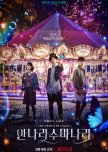A magical and surprisingly deep drama
“Do you…believe in magic?” These five words perfectly capture the essence of Netflix’s newest K-drama, The Sound of Magic. These are also the words uttered by the enigmatic magician fronting this series, Ri-Eul. But is he really magic? Or is everything one big misdirection?
The Sound of Magic plays with this idea constantly, combining elements of The Miracle on 34th Street, Goblin and Extracurricular, blending them together into a beautifully surreal and incredibly thought provoking series.
What begins as a fantastic journey into the world of magic soon takes a dark turn as we’re left to question exactly what we’ve seen.
I’m being careful not to go into spoilers here but suffice to say, The Sound of Magic is a magical series; a wonderful, hedonistic ride boasting strong themes at the heart of this one that gives it a good amount of depth.
The story itself focuses on Ah-Yi, a poor school student who ekes her way through life, struggling to get by. After her mother leaves and her father goes on the run from loan-sharks, Ah-Yi is left with nothing. Se’s struggling to pay her rent and trying to keep up with studies while working part-time. Ah-Yi is in proverbial hell.
Screaming out for help, Ah-Yi’s cry is seemingly answered by Ri-Eul, who encourages her to show up at an abandoned theme park for a magic show she’ll never forget.
As Ah-Yi allows herself to indulge into this fantastical world, she becomes taken with this guy and learns more about the magical world he adopts. Unfortunately, Ah-Yi’s fellow student Il-Deung does not share her enthusiasm and worries that Ri-Eul may be hiding a darker truth.
I won’t go further into the story but the dialogue has been masterfully crafted to deliver little foreshadowed hints to what’s going on.
Beyond the surface level story about magic though is a much darker theme revolving around stress, societal pressure and what constitutes as “normal.”
In this increasingly digitalized world, we’re under more pressure than ever before to portray our best selves at all times. Because of that, those who dare to stand out from the norm or carve a different path for themselves are vilified.
The Sound of Magic plays with that idea to its very core, examining and dissecting what it means to be normal and how the childlike innocence of our youth is ripped apart and replaced by studying, working and trying to pay our bills.
These themes are never explicitly mentioned though, as a lot of this ticks away in the background. Likewise, we’re also not really told some of the more pressing questions one may have about Ri-Eul. While some will be disappointed by this, I personally think it works really well to maintain that aura of wonder and suspicion, which are the two feelings this show conjures and perfectly balances across its run-time.
What’s particularly interesting with The Sound of Magic though is the way this is presented. The whole series is laid out like a musical production at the theatre, complete with musical numbers, a revealing post-credit sequence (no spoilers here!) and a lot of whimsical and fantastical elements thrown in along the way.
Magic tricks aside, The Sound of Magic also has a smattering of dream sequences, interesting choreography and some breath-taking shots of Korea too.
The Sound of Magic won’t be for everyone but the series does a fantastic job fleshing out all of its characters, delivering a simple but effective story and layering all of that with thought provoking and relevant themes about society and our place in the world.
It may not be the best K-drama of the year, but it’s certainly one of the more surprising. This one’s a definite must-watch.
The Sound of Magic plays with this idea constantly, combining elements of The Miracle on 34th Street, Goblin and Extracurricular, blending them together into a beautifully surreal and incredibly thought provoking series.
What begins as a fantastic journey into the world of magic soon takes a dark turn as we’re left to question exactly what we’ve seen.
I’m being careful not to go into spoilers here but suffice to say, The Sound of Magic is a magical series; a wonderful, hedonistic ride boasting strong themes at the heart of this one that gives it a good amount of depth.
The story itself focuses on Ah-Yi, a poor school student who ekes her way through life, struggling to get by. After her mother leaves and her father goes on the run from loan-sharks, Ah-Yi is left with nothing. Se’s struggling to pay her rent and trying to keep up with studies while working part-time. Ah-Yi is in proverbial hell.
Screaming out for help, Ah-Yi’s cry is seemingly answered by Ri-Eul, who encourages her to show up at an abandoned theme park for a magic show she’ll never forget.
As Ah-Yi allows herself to indulge into this fantastical world, she becomes taken with this guy and learns more about the magical world he adopts. Unfortunately, Ah-Yi’s fellow student Il-Deung does not share her enthusiasm and worries that Ri-Eul may be hiding a darker truth.
I won’t go further into the story but the dialogue has been masterfully crafted to deliver little foreshadowed hints to what’s going on.
Beyond the surface level story about magic though is a much darker theme revolving around stress, societal pressure and what constitutes as “normal.”
In this increasingly digitalized world, we’re under more pressure than ever before to portray our best selves at all times. Because of that, those who dare to stand out from the norm or carve a different path for themselves are vilified.
The Sound of Magic plays with that idea to its very core, examining and dissecting what it means to be normal and how the childlike innocence of our youth is ripped apart and replaced by studying, working and trying to pay our bills.
These themes are never explicitly mentioned though, as a lot of this ticks away in the background. Likewise, we’re also not really told some of the more pressing questions one may have about Ri-Eul. While some will be disappointed by this, I personally think it works really well to maintain that aura of wonder and suspicion, which are the two feelings this show conjures and perfectly balances across its run-time.
What’s particularly interesting with The Sound of Magic though is the way this is presented. The whole series is laid out like a musical production at the theatre, complete with musical numbers, a revealing post-credit sequence (no spoilers here!) and a lot of whimsical and fantastical elements thrown in along the way.
Magic tricks aside, The Sound of Magic also has a smattering of dream sequences, interesting choreography and some breath-taking shots of Korea too.
The Sound of Magic won’t be for everyone but the series does a fantastic job fleshing out all of its characters, delivering a simple but effective story and layering all of that with thought provoking and relevant themes about society and our place in the world.
It may not be the best K-drama of the year, but it’s certainly one of the more surprising. This one’s a definite must-watch.
Considerați utilă această recenzie?























